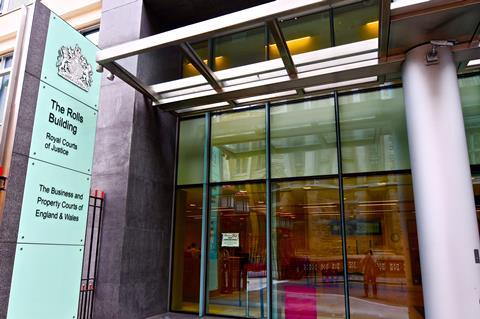Contempt proceedings against a Russian oligarch have today been revived by the Court of Appeal, which held that the High Court applied the wrong legal test when ruling that the application was an abuse of process.
Vladimir Chernukhin, a Russian former deputy finance minister, sought to have Oleg Deripaska committed for contempt of court, claiming he deliberately put millions of pounds’ worth of his shares in EN+ Group ‘beyond the reach’ of the English courts.
The pair have been engaged in a ‘long-running, bitter and high profile dispute’ for several years over the ownership of property in central Moscow. In 2019, the High Court dismissed Deripaska’s challenge to an arbitral award of around $95m (£71m) in relation to the dispute.
Chernukhin obtained a worldwide freezing order shortly after Deripaska was made subject to US sanctions in 2018. Deripaska gave personal undertakings to the court that, if the WFO was discharged, he would preserve around 45m shares in Jersey-registered EN+ Group for the purposes of future enforcement in England.
However, EN+ Group was later ‘redomiciled’ in Russia, which Chernukhin and his company Navigator Equities Ltd contended made the shares ‘effectively worthless’ and amounted to a breach of the undertakings.
Last year, the High Court dismissed Chernukhin’s committal application as an abuse of process, with Mr Justice Andrew Baker finding it was presented in ‘a heavy-handed, aggressively partisan fashion, that was inappropriate, vexatious and unfair’. The judge said that an applicant ‘pursues a contempt charge as much as quasi-prosecutor serving the public interest as it does as private litigant pursuing its own interests in the underlying dispute’.

Baker was also critical of Marie-Emmanuel Berard, a partner at magic circle firm Clifford Chance who represented Chernukhin. Baker said her evidence was ‘seriously misleading’ and ‘lacked candour’, adding that she ‘lost, or never had, that degree of objectivity and detachment from her client that a fair prosecution of this contempt application, with its quasi-criminal character, required’.
However the Court of Appeal today overturned Baker’s decision and remitted the committal application to the High Court. Lady Justice Carr said Baker ‘reached his conclusions on the basis of two fundamental misapprehensions’, including that it was common ground that the shares, as defined in the undertakings, ‘would still exist upon and following the redomiciliation’ of EN+ Group.
Baker’s ‘misconceptions’ about the effect of the undertakings and the redomiciliation ‘coloured his view of the propriety of the commencement of the contempt application in the first place, of Ms Berard’s conduct and degree of partisanship as a whole, and of the appellants’ motive’, Carr said.
Carr further found Baker ‘failed to take any (or any proper) account of the fact that … the contempt application was properly arguable’.
She also emphasised that substantive and procedural fairness was important on an application for civil contempt, but added that it was not correct to say ‘that the appellants (or their lawyers) were under a duty to act wholly impartially or as if they had no legitimate private interest in the outcome’.
Baker’s ‘assessment of the appropriateness of the manner in which the contempt application was presented and pursued by the appellants and their lawyers is undermined by the fact that it was carried out on the incorrect premise that their duty was to prosecute the contempt application solely as guardians of the public interest,’ Carr concluded.





























2 Readers' comments